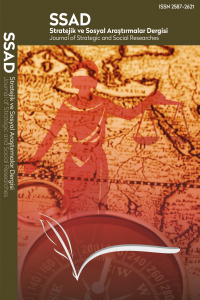TÜRK-YUNAN İLİŞKİLERİNİN AZINLIKLARA YANSIMASI (1923-1991)
Öz: Lozan Barış Konferansı’nda Türkiye ve Yunanistan arasında sorunlar çözülmeye çalışılırken mübadele meselesi gündeme gelmiş ve Mübadele Protokolü imzalanmıştır. Diğer taraftan, protokol dışında kalanlara azınlık statüsü verilmiştir. Bu azınlıklar, Türkiye’de İstanbul Rumları, Yunanistan’da ise Batı Trakya Türkleri’dir. Lozan’dan sonra iki devlet arasında sorunlar çözülmemiş, 1930’da taraflar tekrar anlaşma yoluna giderek azınlıklar meselesini çözmeye çalışmıştır. Sonrasında ise, II. Dünya Savaşı ve Soğuk Savaş döneminde iki devlet arasındaki ilişkiler yumuşamıştır. Bu süreçlerde, özellikle Soğuk Savaş döneminde, iki devlet arasında olumlu gelişmeler yaşanırken bu durum azınlıkları da etkilemiştir. Özellikle, iki devletin ABD’den yardım almaları ve NATO’ya girmeleri bu gelişmelerde oldukça etkili olmuştur. Ancak bu olumlu gelişmeler fazla uzun sürmemiş, 1950’lilerde Kıbrıs Meselesi gündeme gelmiştir. Özellikle Kıbrıs Meselesi’ne paralel olarak, iki devletin kendi ülkelerindeki azınlıklara uyguladıkları politikalarda değişiklik yaptıkları görülmektedir. Bu çalışmada; Yunanistan’ın Batı Trakya Türklerine, Türkiye’nin ise İstanbul Rumlarına uyguladığı politikalar arşiv belgeleri ve çağdaş gazetelere göre incelenmiş, Türk-Yunan ilişkilerinin azınlıklara yansıması eş zamanlı olarak değerlendirilmiştir.
Anahtar Kelimeler:
Türkiye, Yunanistan, Batı Trakya Türkleri, İstanbul Rumları
Effects Of Turkish-Greek Relations On Minorities (1923-1991)
Lausanne Peace Conference not only witnessed the problem solution process between Turkey and Greece but also included the question of population exchange and the Protocol for Population Exchange was signed during the conference. On the other hand, those who remained out of the protocol were given the minority status. Namely, these minorities are Istanbul Greeks of Turkey and Western Thracian Turks of Greece. The problems between the two countries were not settled after Lausanne; therefore, the parties strove to solve the issue of minorities through renewed negotiations in 1930. After that, the relations between the two countries enhanced during the World War II and Cold War. During these processes, especially during the Cold War period, the flourishing developments between the two countries positively affected the minorities as well. Especially these two countries’ reception of aid from the US and ascension to NATO were highly influential on these positive developments. However, these positive developments did not last much and Cyprus Question came to the surface during 1950s. Especially in line with the Cyprus Question, it is visible that these two countries introduced changes to their policies on minorities. This study focuses on the policies of Greece on Western Thracian Turks and the policies of Turkey on Istanbul Greeks under the light of archival documents and periodicals of the time and simultaneously evaluates the effects of Turkish-Greek relations on minorities.
Keywords:
Turkey, Grecee, Western Thracian Turks, Istanbul Greeks,
___
- BCA, 30-10-0-0; 86-569-8; 24 Ocak 1944, s. 2; BCA, 30-10-0-0; 85-560-19; 17 Mart 1943; BCA, 30-18-1-2; 110-20-9; 15 Mart 1946; BCA, 30-10-0-0; 87-576-5; 22 Ocak 1947; BCA, 30-10-0-0; 109-733-2; 27 Aralık 1948; BCA, 490-1-0-0; 608-110-7; 28 Mart 1950, s. 41-42; BCA, 490-1-0-0; 608-110-7; 28 Mart 1950, s. 38-39; BCA, 30-1-0-0; 19-110-5; 9 Eylül 1955, s. 2; BCA, 30-1-0-0; 133-869-5; 11 Eylül 1955; BCA, 30-1-0-0; 19-110-9; 17 Eylül 1955.
- ISSN: 2587-2621
- Yayın Aralığı: Yılda 3 Sayı
- Başlangıç: 2017
- Yayıncı: Mehmet Ali KARAMAN
Sayıdaki Diğer Makaleler
NÜFUS MÜBADELESİ VE BATI TRAKYA TÜRKLERİ
ONTOLOJİK GÜVENLİK BAĞLAMINDA TÜRK[İYE]-YUNAN[İSTAN] ÇATIŞMASI
BODRUM'DAKİ GİRİTLI TÜRKLERİNİN SÖZLÜ HATIRALARI VE GİRİT KİMLİĞİ
KOLEKTİF HAFIZANIN DERİN DEHLİZ MABEDİ: AYASOFYA
GÜNÜMÜZ YUNANİSTAN’INDA MÜSLÜMAN KARŞITI NEFRET VE AYRIMCILIĞI YENİDEN DÜŞÜNMEK
